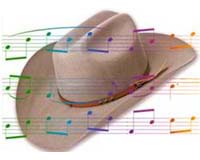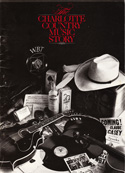Arthur Smith
Arthur Smith, nationally known for writing and recording Dueling Banjos and Guitar Boogie, has been an important part of the Charlotte-area music scene from the early days of field recording up to the present.

Born April 1, 1921, Arthur Smith (no relation to Fiddling Arthur Smith) grew up in the cotton mill town of Kershaw, South Carolina, some sixty miles south of Charlotte. His father worked as a loom fixer in the Springs Mills plant there and in his spare time directed the town’s brass band, a familiar part of village life in many Southern mill communities then. Arthur’s first instrument was trumpet, and he still counts jazzmen Louis Armstrong, Stephane Grappelli, and Django Reinhart among his major influences. Soon he picked up fiddle and guitar and before long, he remembers, “could get around on most any stringed instrument.”
Mill children in the 1920s went to work early. Before Arthur Smith reached his teens he had a job in the Springs card room. Music offered a welcome alternative to mill labor, and at thirteen Smith won his first regular spot on radio. The Arthur Smith Quartet didn’t play stringband music at first: they played Dixieland jazz. In a 1977 article in Bluegrass Unlimited, Smith told interviewer Don Rhodes: “We nearly starved to death until one day we changed our style: we had been doing a daily radio show over WSPA Radio in Spartanburg, South Carolina, as the Arthur Smith Quartet. One Friday we threw down our trumpet, clarinet, and trombone and picked up the fiddle, accordian, and guitar. . . The next Monday we came back on the radio program as Arthur Smith and the Carolina Crackerjacks.”
Smith recalls the Crackerjacks made their first records at an RCA Victor field session at the Andrew Jackson Hotel in Rock Hill, South Carolina: “Our best song from that was one called Going Back to Old Carolina. RCA session sheets indicate that the date was September 29, 1938.
During the 1940s, country music changed dramatically. The major recording companies fixed their gaze on Nashville and its top-selling recording stars. Independent studios arose to record less commercially viable artists, either leasing the masters to larger companies or marketing records themselves on new small labels. The country sound began to absorb commercial pop and jazz influences. Most noticeably of all, musicians began to use electric instruments.
These changes adversely affected the careers of many pre-World War II entertainers, but Arthur Smith turned these developments to his advantage. He had always loved jazz, and he had begun featuring electric guitar on the radio as early as 1938: “One time the guy at a pawnshop had an amp and guitar. He got me to play the thing, and when its owner didn’t come back to claim it, I ended up buying it.” In 1945 he recorded a jazzy guitar instrumental called Guitar Boogie for the small label Super Disc Records. Guitar Boogie, which was based on a classic blues chordal progression, rocketed to the top of the country charts—the first instrumental to do so—then crossed over to rise to number one on the pop lists.
Today Arthur Smith is best remembered by Carolinians for his quarter of a century as a regular on WBT radio and television. He joined WBT radio about 1943 and in 1945 became a featured performer on Carolina Hayride (later Carolina Calling] which aired nationally on CBS from Charlotte each Saturday afternoon. Smith also broadcast a daily local program for years called The Corner Store. In the early 1950s, the program featured Arthur and his brothers Sonny and Ralph with announcer Clyde McLean in a mixture of music and cornball comedy.
When WBTV signed on in 1951, Arthur Smith took part in the first live telecast in the Carolinas. During the 1950s and 1960s he broadcast a live morning show and a weekly evening program that was syndicated on over a hundred TV stations at its peak. In the process he aided the careers of popular Carolina musician Tommy Faile and bluegrass banjo star Don Reno, both of whom spent extended periods as Smith sidemen.
While at the WBT/WBTV studios in the now-demolished Wilder Building in downtown Charlotte, Arthur Smith worked up Dueling Banjos. One day in 1955, Smith picked up his tenor banjo and motioned Don Reno to strap on a 5-string banjo, saying, “You just follow me.” Monument Records released the result as Feuding Banjos. In 1973, Warner Brothers used the melody for the movie Deliverance and released a hit record version entitled Dueling Banjos. Smith sued to be acknowledged as composer, and continues to collect royalties to this day.
Over the years, Arthur Smith has been successful at numerous business ventures outside performing. Among the earliest was a grocery chain, which he sold to the Red & White Company with the agreement that he produce their commercials. Long-time Charlotteans still grin remembering the jingle in which Smith’s down home drawl rhymed “buy it” with “White.” In 1959 Smith opened his own independent recording studio. The two-story brick building at 5457 Monroe Road became a leading producer of syndicated radio shows for performers, including Johnny Cash. Hundreds of country albums and advertising jingles were recorded there, and even a 1965 hit for soul singer James Brown, called Papa’s Got a Brand New Bag. In 1977, Smith and partner Christian M. Haerle founded CMH Records, a major bluegrass label which made many of its albums in Charlotte.
Today in 1985, Arthur Smith is largely retired from performing and has sold his studio. He keeps as busy as ever, though, with diverse business interests from music publishing (he has written nearly one hundred hymns including Acres of Diamonds and controls rights to more than five hundred songs) to a series of fishing tournaments. He remains a prolific producer of television and radio ads, and a leading citizen of the Charlotte community.
— from George Holt, ed., The Charlotte Country Music Story (Spirit Square Arts Center and North Carolina Arts Council, 1985)
Updated 2015
Arthur Smith’s death on April 3, 2014, at age 93 made Page 1A of the Charlotte Observer. Writer Joe DePriest noted Guitar Boogie‘s influence on Paul McCartney, reporting that the former Beatle keeps a 45 of Arthur Smith’s version in his office — McCartney played the tune as his audition for the Quarrymen, soon to become the Beatles.

Musicians who took part in the Charlotte Country Music Story concerts
Briarhoppers and Charles Crutchfield
Joe and Janette Carter
Claude Casey
Tommy Faile
George Hamilton IV
Snuffy Jenkins and Homer “Pappy” Sherrill
Johnson Family Singers and Betty Johnson
Fred Kirby
Roy Lear
Wade Mainer
Bill Monroe
Zeke and Wiley Morris
Sam Poplin
Red Clay Ramblers
Arthur Smith
Tennessee Ramblers with Cecil Campbell and Harry Blair
Charlotte/Rock Hill Recordings available on CD (36 page pdf)

